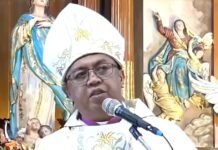The Provincial Board, through Vice Governor Peter Cua’s privilege speech, admitted that a significant factor in their decision to repeal the mining ordinance was the public outcry or the expression of opposition from various sectors. A major part of this was the open letter from Bishop Manolo Delos Santos, as well as statements on radio and social media.
In an interview with Radio Peryodiko, the official stated that their concern is the survival of the residents due to the decline in the price of abaca and other livelihoods, affecting many citizens not only in Panganiban but also in other areas in the province with abundant coal deposits.
Part of their decision, according to them, was the consensus with Governor Joseph Cua, who also listened to the calls from various sectors to stop the ordinance. The Vice Governor’s question is what recommendations environmentalists have for providing livelihoods for struggling residents.
In my personal opinion, the Provincial Board, particularly the Vice Governor, has a point in this step. However, is there no other recourse for the residents of Catanduanes to survive?
For the past few years, Catanduanons have lived without mining, and if there were any illegal activities, at least some were prevented, rather than allowing possible opportunists to take advantage of the law.
The one-year allocation is a significant blow to the environment if there are those who will abuse the privilege given. If abaca is the reason for the economic downturn of the residents, then abaca should also be the solution to the problem.
The drop in the price of abaca is allegedly due to the hoarding by farmers. Most of the traders are not in the first class because some abaca farmers prefer shortcuts. As leaders of the province, it is better to coordinate with the national government to show that the residents are suffering due to the lack of stable livelihoods caused by the decline in the price of abaca and other potential sources of income.
Mining can be considered, but it should be the last recourse. Since coal is non-renewable energy, if mined, it might not return like other minerals.
Despite everything that happened, we still admire the Provincial Board for repealing the ordinance for the sake of the majority. As representatives of the people, the pulses of the public should be heard.
It seems that in their committee hearing or public hearing, the main concerns were not invited. The DENR, the Municipal Council of Panganiban, and other sectors, including those who complained, were not included. If it had undergone a comprehensive hearing, it might not have reached the point of being in the limelight and becoming the subject of criticism.
Another thing to look at here is the possible legal infirmities if the national law is used as a basis, especially the law on expanded protected areas, which may be subject to legal questions in due time.
Lastly, even though their move to repeal may be a slap in the face, it is justifiable rather than escalating the scenario of division among the Catanduanons.
For elected officials, there are things we want to pursue for the economic survival of the residents, but we should also consider the environmental effects, especially the security of the residents because Catanduanes is prone to typhoons aside from being an island. As they say, “The ends cannot justify the means.”
It is crucial for the planned forum of Catanduanes State University on December 11, 2023, to proceed. It is essential to comprehensively explain the important laws, issues regarding the status of God-given resources on the island and how they can be used, the economic survival of the residents, and alternative livelihoods that can be sources to rise above the experiencing hardships.
**************
Now, let’s backtrack to our monitoring of the issue in the past three weeks regarding the Mining Ordinance.
The local government of Panganiban and the Municipal Council were resolute in opposing mining in their area.
In the conducted consultation in selected barangays, the Municipal Council, led by Vice Mayor Arvin Atencia, explained their stand against mining. They visited the barangays of Cabuyoan and the adjacent barangay of San Miguel, as well as the barangays in the Poblacion of the said town.
According to Atencia, there was a misconception regarding why around 200 residents submitted a petition. They allegedly petitioned, thinking that mining was not prohibited in their area. Apart from this, there were purported mining activities in the area, where people from some barangays in Viga were digging, prompting them to wonder why they couldn’t benefit from the area.
Due to the consultation, the residents of Cabuyoan and Barangay San Miguel, where strong opposition to mining was expressed, reportedly gained clarity.
In an interview with Radio Periodiko, the Vice Mayor said that they were not consulted on the approval of the Provincial Board for the suspension of the mining-free ordinance, which served as the basis for their ordinance. Apart from the Municipal Council of Panganiban and the Catholic Church, almost many sectors opposed the move of the Provincial Board.
In an interview with Radio Periodiko, Vice Governor Peter Cua stated that they simply complied with the request of the residents to provide them with alternative livelihoods. He said it is a small-scale effort using picks and shovels, with no large equipment to be used. If there are potential investors, they will go through the necessary permits from the relevant agencies. In case of violations, they themselves will immediately withdraw due to the moratorium of the ordinance.
Despite this, he mentioned that they are willing to conduct a symposium to enlighten those who oppose, as well as to present the provincial government’s side.
Meanwhile, CatSU has set the symposium on December 11, from 2 to 5 in the afternoon. The goal, they said, is to comprehensively explain the essential laws, issues regarding the status of God-given resources on the island and how they can be used, the economic survival of the residents, and alternative livelihoods that can be sources to rise above the experiencing hardships.
*************
The Panganiban local government and the Municipal Council were firm in their stand against mining in their area.
In the conducted consultation in selected barangays, the Municipal Council, led by Vice Mayor Arvin Atencia, explained their stand against mining. They visited the barangays of Cabuyoan and the adjacent barangay of San Miguel, as well as the barangays in the Poblacion of the said town.
According to Atencia, there was a misconception regarding why around 200 residents submitted a petition. They allegedly petitioned, thinking that mining was not prohibited in their area. Apart from this, there were purported mining activities in the area, where people from some barangays in Viga were digging, prompting them to wonder why they couldn’t benefit from the area.
Due to the consultation, the residents of Cabuyoan and Barangay San Miguel, where strong opposition to mining was expressed, reportedly gained clarity.
In an interview with Radyo Peryodiko, the Vice Mayor said that they were not consulted on the approval of the Provincial Board for the suspension of the mining-free ordinance, which served as the basis for their ordinance. Apart from the Municipal Council of Panganiban and the Catholic Church, almost many sectors opposed the move of the Provincial Board.
In an interview with Radyo Peryodiko, Vice Governor Peter Cua mentioned that they simply complied with the residents’ request to provide them with an alternative livelihood. According to him, it is a matter of the residents’ survival, where it is only on a small scale, using picks and shovels.
There are allegedly no large machines to be used. If there are potential investors who wish to apply, they will go through the necessary permits from the relevant agencies. In case of violations, they themselves will reportedly withdraw immediately due to the moratorium of the ordinance.
In the latest information, the Provincial Board reportedly completely repealed the said ordinance through Vice Governor Cua’s privilege.























